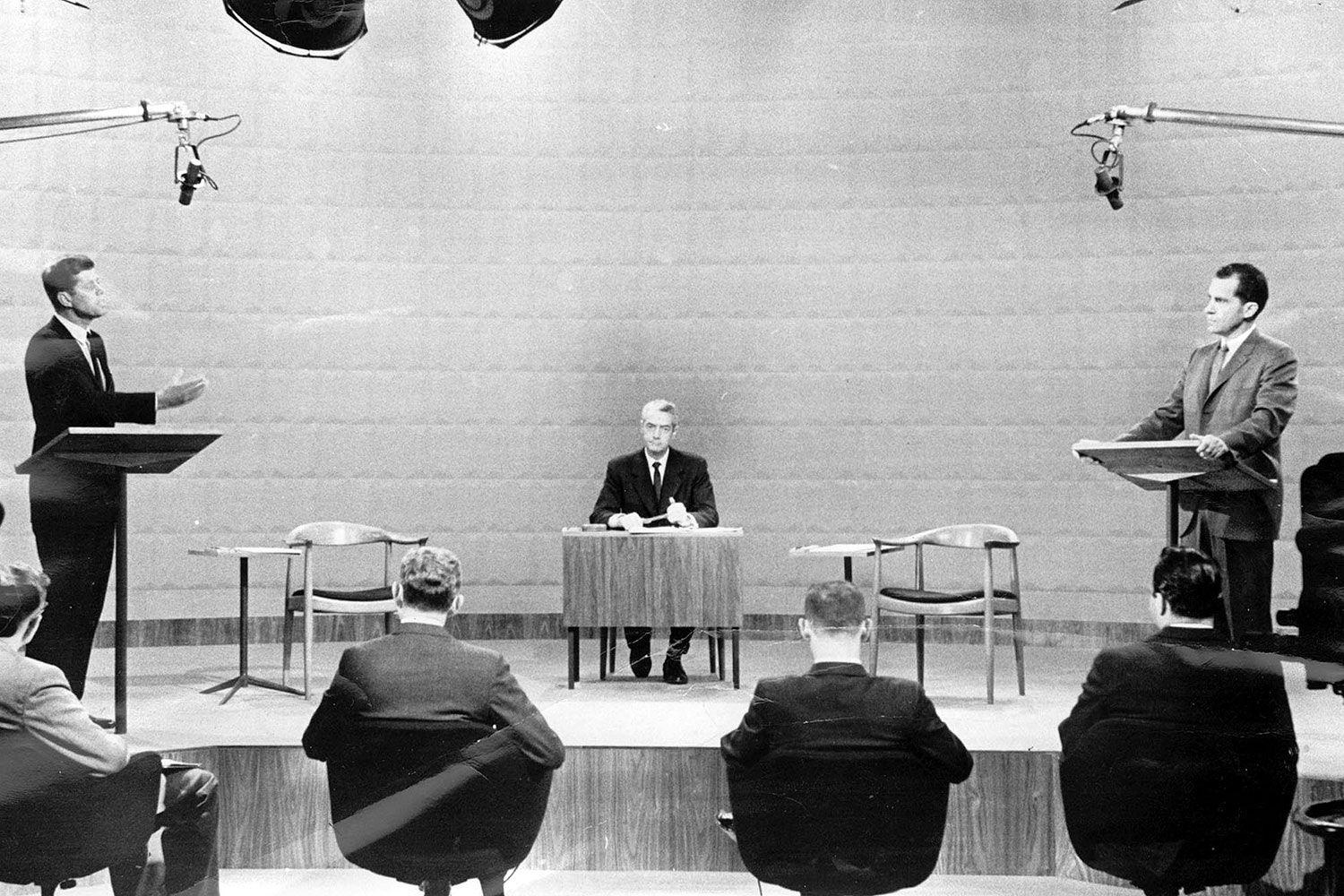On this date in 1960, John F. Kennedy and Richard Nixon squared off in the first televised presidential debate, at WBBM's studios in Chicago. It's often considered to be the point where television began to dominate print and style began to dominate substance, although after the last of their four televised presidential debates, there wouldn't be another until 1976.
That idea has its origins in a poll that found Kennedy won over television viewers, impressed by his vigor over Richard Nixon's sweaty pallor. Three days later, the Chicago Daily News ran an (incorrect) lead story that asked, "Was Nixon Sabotaged By TV Makeup Artist?" The poll, though, had serious problems. It didn't correct for the fact that radio listeners were, by and large, rural, Protestant, and conservative. After journalists enshrined this idea into myth, historians have cast doubt on its accuracy, but the conclusion shaped decades of thought, as David Greenberg writes in Slate:
Still, is there any harm if everyone believes it? It's hard to say. But maybe. This garbled historical factoid has become, as Vancil and Pendell wrote, "part of the foundation for a variety of concerns" that TV images distort our politics—or what Schudson called "telemythology." It has played a role in legitimizing a critique of television and politics that may be somewhat oversimplified.
That's not to say the debates weren't crucial for Kennedy. The legendary pollster George Gallup found that, after the first debate, Kennedy jumped from 32 percent "very favorable" among independents to 46 percent, while Nixon moved from 46 percent to just 50 percent. After all four, Gallup found that Kennedy did a better job, 42 percent to 30 percent (with 23 percent calling it a draw), and that the "enthusiasm quotient" shifted from 42 percent for Nixon and 43 percent to Kennedy to 36 percent for Nixon and 43 percent for Kennedy.
For that first debate, however, George Gallup assembled a live focus group that gave what might be more resonant conclusions. It consisted of two groups: 125 people who rated the two candidates before and after, and who noted the best points each made during the debate. There was another group of 60 people who reacted in real time using the Hopkins Televote Machine, which Gallup had initially begun using on audiences watching movies.
From the two audiences, George Gallup got strikingly different responses, as he noted in a syndicated article that followed the debate. From the group of 125, those who thought Kennedy won told Gallup that "Kennedy was more constructive and definitive in his program proposals … his rebuttals were much more to the point and dealt less in generalities … composed command of specific information."
Those who thought Nixon won said his "policies and proposals were more sound … he made more more concrete suggestions for the future. … Nixon was more specific, factual, and logical. … Nixon had a program with an explanation."
Sounds great, right? Lots of substance, just like we want. But the sample of 60 undecided voters, reacting in real time, presented a much different picture:
Both men tended to bring forth better reactions when they were speaking in an inspirational, more generalized manner.
Kennedy, for example, scored well on such phrases as "If we fail, then freedom fails," or "I think it's time America started moving again," or "I want them to say these were the years when the tide came in: these were the years when the United States started to move again."
Nixon elicited favorable reactions with comments such as: "A record is never something to stand on. It's something to build on," or "No President should ever allow anybody else to make the major decisions," or "I stand for programs that will mean growth and progress."
[snip]
Kennedy, on the other hand, was effective in talking about education. His highest single point came when he remarked: "I think we should have an educational system second to none."
Make America great again, basically. How about those answers that "dealt less in generalities" with "specific information" that were "factual and logical"?
Both men tended to "use" their audience—that is, provoke negative reaction—when they went into recitations of facts and figures—citing statistics about gross national product, growth, salaries, and so forth.
The candidates were also quick to seize on the gamesmanship of the debates; "the two sides bickered over details: the colors of the studio walls, the length of the program, the number of debates," David Folkenflik writes. Nixon charged that Kennedy broke a pact not to use notes; Kennedy said that he merely had documents that he wanted to quote accurately: "If I'm going to quote the President of the United States on a matter involving national security, he should be quoted accurately."
Meanwhile, something else was going on in Chicago, below the radar of the national press, that likely made a much bigger difference to the outcome of what would be an impossibly close election. As Ethan Michaeli describes in his book about the Chicago Defender, the former Defender reporter turned Democratic operative Louis Martin convinced the Kennedy camp that the black vote was critical to victory. They took his advice: The Defender endorsed Kennedy, and Kennedy beat Nixon by 190,000 votes in the city's black wards, a critical victory over the party of Lincoln in the Land of Lincoln, securing its 27 electoral votes by fewer than 9,000 votes across the state.



